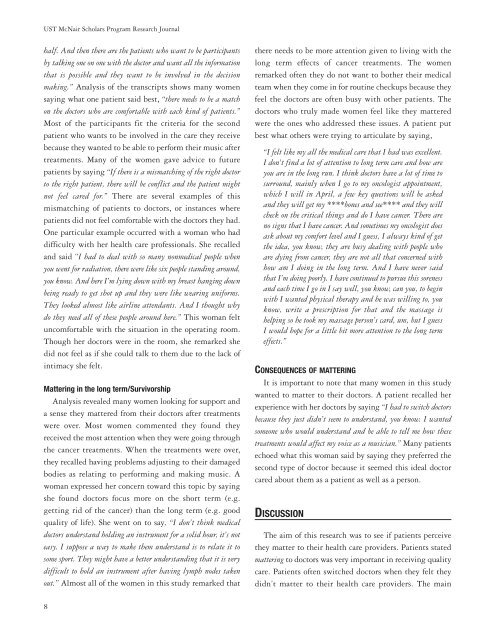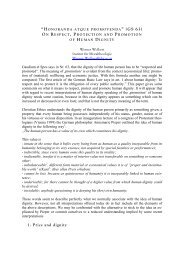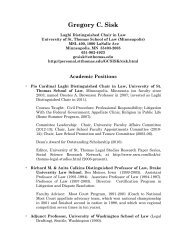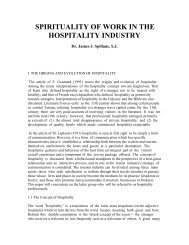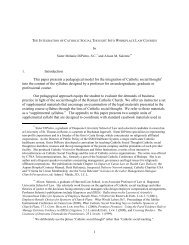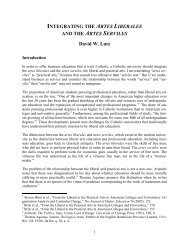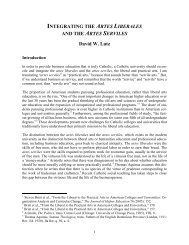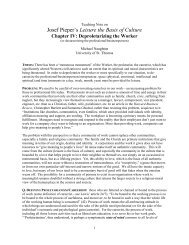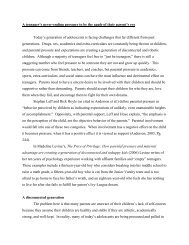dr. ronald e. mcnair acknowledgements - University of St. Thomas
dr. ronald e. mcnair acknowledgements - University of St. Thomas
dr. ronald e. mcnair acknowledgements - University of St. Thomas
You also want an ePaper? Increase the reach of your titles
YUMPU automatically turns print PDFs into web optimized ePapers that Google loves.
UST McNair Scholars Program Research Journal<br />
half. And then there are the patients who want to be participants<br />
by talking one on one with the doctor and want all the information<br />
that is possible and they want to be involved in the decision<br />
making.” Analysis <strong>of</strong> the transcripts shows many women<br />
saying what one patient said best, “there needs to be a match<br />
on the doctors who are comfortable with each kind <strong>of</strong> patients.”<br />
Most <strong>of</strong> the participants fit the criteria for the second<br />
patient who wants to be involved in the care they receive<br />
because they wanted to be able to perform their music after<br />
treatments. Many <strong>of</strong> the women gave advice to future<br />
patients by saying “If there is a mismatching <strong>of</strong> the right doctor<br />
to the right patient, there will be conflict and the patient might<br />
not feel cared for.” There are several examples <strong>of</strong> this<br />
mismatching <strong>of</strong> patients to doctors, or instances where<br />
patients did not feel comfortable with the doctors they had.<br />
One particular example occurred with a woman who had<br />
difficulty with her health care pr<strong>of</strong>essionals. She recalled<br />
and said “I had to deal with so many nonmedical people when<br />
you went for radiation, there were like six people standing around,<br />
you know. And here I’m lying down with my breast hanging down<br />
being ready to get shot up and they were like wearing uniforms.<br />
They looked almost like airline attendants. And I thought why<br />
do they need all <strong>of</strong> these people around here.” This woman felt<br />
uncomfortable with the situation in the operating room.<br />
Though her doctors were in the room, she remarked she<br />
did not feel as if she could talk to them due to the lack <strong>of</strong><br />
intimacy she felt.<br />
Mattering in the long term/Survivorship<br />
Analysis revealed many women looking for support and<br />
a sense they mattered from their doctors after treatments<br />
were over. Most women commented they found they<br />
received the most attention when they were going through<br />
the cancer treatments. When the treatments were over,<br />
they recalled having problems adjusting to their damaged<br />
bodies as relating to performing and making music. A<br />
woman expressed her concern toward this topic by saying<br />
she found doctors focus more on the short term (e.g.<br />
getting rid <strong>of</strong> the cancer) than the long term (e.g. good<br />
quality <strong>of</strong> life). She went on to say, “I don’t think medical<br />
doctors understand holding an instrument for a solid hour, it’s not<br />
easy. I suppose a way to make them understand is to relate it to<br />
some sport. They might have a better understanding that it is very<br />
difficult to hold an instrument after having lymph nodes taken<br />
out.” Almost all <strong>of</strong> the women in this study remarked that<br />
8<br />
there needs to be more attention given to living with the<br />
long term effects <strong>of</strong> cancer treatments. The women<br />
remarked <strong>of</strong>ten they do not want to bother their medical<br />
team when they come in for routine checkups because they<br />
feel the doctors are <strong>of</strong>ten busy with other patients. The<br />
doctors who truly made women feel like they mattered<br />
were the ones who ad<strong>dr</strong>essed these issues. A patient put<br />
best what others were trying to articulate by saying,<br />
“I felt like my all the medical care that I had was excellent.<br />
I don’t find a lot <strong>of</strong> attention to long term care and how are<br />
you are in the long run. I think doctors have a lot <strong>of</strong> time to<br />
surround, mainly when I go to my oncologist appointment,<br />
which I will in April, a few key questions will be asked<br />
and they will get my ****bones and see**** and they will<br />
check on the critical things and do I have cancer. There are<br />
no signs that I have cancer. And sometimes my oncologist does<br />
ask about my comfort level and I guess, I always kind <strong>of</strong> get<br />
the idea, you know, they are busy dealing with people who<br />
are dying from cancer, they are not all that concerned with<br />
how am I doing in the long term. And I have never said<br />
that I’m doing poorly. I have continued to pursue this soreness<br />
and each time I go in I say well, you know, can you, to begin<br />
with I wanted physical therapy and he was willing to, you<br />
know, write a prescription for that and the massage is<br />
helping so he took my massage person’s card, um, but I guess<br />
I would hope for a little bit more attention to the long term<br />
effects.”<br />
CONSEQUENCES OF MATTERING<br />
It is important to note that many women in this study<br />
wanted to matter to their doctors. A patient recalled her<br />
experience with her doctors by saying “I had to switch doctors<br />
because they just didn’t seem to understand, you know. I wanted<br />
someone who would understand and be able to tell me how these<br />
treatments would affect my voice as a musician.” Many patients<br />
echoed what this woman said by saying they preferred the<br />
second type <strong>of</strong> doctor because it seemed this ideal doctor<br />
cared about them as a patient as well as a person.<br />
DISCUSSION<br />
The aim <strong>of</strong> this research was to see if patients perceive<br />
they matter to their health care providers. Patients stated<br />
mattering to doctors was very important in receiving quality<br />
care. Patients <strong>of</strong>ten switched doctors when they felt they<br />
didn’t matter to their health care providers. The main


